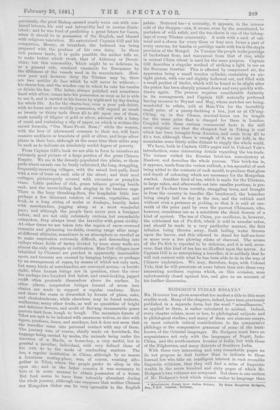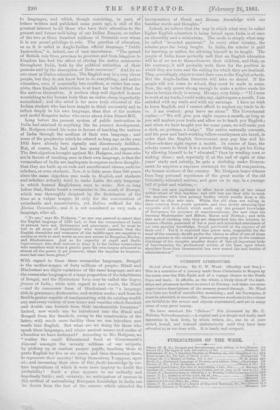and there the scene is diversified by forests of pines,
oaks, MR. HODGSON has given somewhat too modest a title to this most and rhododendrons ; while elsewhere may be found walnuts, erudite work. Many of the chapters, indeed, have been previously mulberries, many other fruits, as well as quantities of bright published in a separate form, but the word "miscellaneous," and delicious flowers, and south of Bat'ang innumerable green as applied to them, is rather calculated to mislead. Indeed, Parrots dart from bough to bough. The mountain forests of every chapter relates, more or less, to philological subjects and 11ibet are said to be infested with enormous wolves, as also with to philological studies ; and, many of them are abstruse essays, tigers, panthers, bears, and monkeys, but it does not seem that or most valuable critical contributions to the comparative -the traveller came into personal contact with any of them, philology or the comparative grammar of some of the least- The journey was, of course, chiefly made on horseback, the known of the Oriental languages. Mr. Hodgson must have an baggage being carried by mules, the animals being under the acquaintance not only with the languages of Nepitl, indo- direction of a Ma-fu, or horse-boy, a very useful, but in China, and the north-eastern frontier of India, but with those general a peculiar, individual, with very defined ideas of of the Nfigherries, and many districts of Southern India.
his own as to the mode of conducting matters. The With these very interesting and very remarkable pages we inn, a regular institution in China, although by no means a luxurious resting-place, was, do not propose to deal further than to indicate to those of course, wanting alto- learned, few who take an intelligent interest in such recondite gethsr in Tibet, where the people prefer to sleep in the linguistic criticism, that they will find a mine of linguistic open air; and in the latter country it was necessary to wealth in the seven hundred and sixty pages of which Mr. hire or n some manner to obtain possession of a house. Hodgson's two volumes are composed. But there is one section But food seems to have been tolerably abundant during of Mr. Hodgson's book which relates rather to language than
the whole journey, although one supposes that neither Chinese * Miscellaneous Essays upon Indian Subjects. By Iklan Houghton Hodgson. nor Mongolian dishes can be very agreeable to the English Ess., F.H.B. London; TrUbner.
to languages, and which, though consisting, in part, of letters written and. published some years ago, is still of the greatest interest to all those who turn their attention to the present and future wellbeing of our Indian. Empire, or rather of the two or three hundred millions of Orientals over whom it is our proud privilege to rule. The question of education, or as it is called in Anglo-Indian official language, "Public Instruction," is, indeed, one of vast importance. "The spread of British rule from province to province and from kingdom to kingdom has had. the effect of closing the native seminaries throughout India, both by the political extinction of. their patrons and by the absorption of their resources." And let no one sneer at Native education. The English may be a very clover people, but they do not know how to do everything ; and native education, even if essentially less excellent, or rather less com- plete, than English instruction, is at least far better fitted for the natives themselves. A mutton chop well digested is more nourishing to the human body than an entire sheep imperfectly assimilated ; and the mind is far more truly educated of the Indian student who has been taught to think accurately and to reflect deeply in his own language, than that of the modern and model Bengalee baboo who raves about John Stuart Mill.
Long before the present system of public instruction in India had attained to anything like its present development, Mr. Hodgson raised his voice in favour of teaching the natives of India through the medium of their own language ; and some of the prophecies which he uttered as long ago as the year. 1835 have already been signally and disastrously fulfilled.
Bat, of course, he had and has many and able opponents. The first objection brought against Mr. Hodgson, and those who are in favour of teaching men in their own language, is that the
vernaculars of India are inadequate to express modern thought ; that they are built up on rude and uncultivated idioms, unfit for scholars, or even students. Now, it is little more than '300 years since the same objection was made to English, and students and scholars actually tried to make Latin the only language
in which learned Englishmen were to write. Not so long before that, Dante found a vernacular in the south of Europe, which was thoroughly despised by the doctrinaires of the time as a vulgar tongue, fit only for the conversation of
swineherds and mountebanks, yet Italian sufficed for the Divina Commedia ; and it is not considered so very rude a language, after all.
" No one," says Mr. Hodgson, "no one can pretend to assert that the English language of 1530 had, or that the vernaculars of India at present have not, dictionaries and grammars ; and he must be lost to all sense of impartiality who would maintain that the English chronicles and romances of the middle-ages are superior in matter or style to such works as are now extant in Bengalee, Hindee, and Hindoostaneo. And as for capacity of rapid and facile improvement, who shall venture to deny it to the Indian vernaculars who considers with what a giant's pace his own tongue advanced to almost all the power it yet possesses, when the impulse to improve- ment had once been given With regard to these three vernacular languages, Bengali is the mother-tongue of forty millions of people ; Hindi and Hindostani are slight variations of the same language, and are the vernacular languages of a large proportion of the inhabitants of Bengal, and the Eindoatani form may be called the lingna franca of India ; while with regard to new words, the Hindi —and its commoner form of Hiudostani—is "a language rich in grammars, dictionaries, and written works ; and from its flexible genius capable of amalgamating with its existing wealth any and every variety of new terms and vocables which Sanskrit and Arabic can furnish from their inexhaustible fountains." Indeed, new words can be introduced into the Hindi and Bengali from the Sanakrit, owing to the construction of the latter, with much more facility than we can introduce new words into English. But what are we doing for those who speak these languages, and whOse ancient means and modes of education we have destroyed P According to Mr. Hodgson, we " scatter the small Educational fund at Government's disposal amongst the seventy millions of our subjects, by picking up at random pauper pupils, teaching them to prate English for five or six years, and then dismissing them, to regenerate their counbry ! living themaolves, I suppose, upon air, and increasing their store of this facile knowledge by cer- tain inspirations of which it were mere impiety to doubt the probability ! Such a plan appears to me radically and hopelessly futile ; and, certainly, no anticipation of success in this method of natnralisiug European knowledge in India can be drawn from the fact of the success which attended the
incorporation of Greek and Roman knowledge with our familiar words and thoughts."
Indeed, we believe that the way in which what may be called higher English education is being forced upon India is at once
an absurdity and a misfortune. The mode is simply what may be called "inverted payment." In every other country, the scholar pays for being taught. , In India, the scholar is paid for learning, or rather, for allowing himself to be taught. The people of India know perfectly well that an English education
will be of no use to themselves .or their children, and that, on the contrary, it will probably unfit them for the position in which they are born and the calling for which they are destined. They, accordingly, object to send their sous to the English schools. But the Anglo-Indian theorists will take no denial. If the people will not conic to school, they must be made to come. Now, the only power strong enough to make a native waste his time in foreign study is money. He says, very fairly —"If I were to work at my trade, I could make, say, eight rupees a month. lam satisfied with my trade and with my earnings. I have no wish
to learn English, and I cannot afford to neglect my trade to do,
so. I am content ; pray leave me alone." The Government replies;—" We will give you eight rupees a month, as long as you will neglect your trade and allow us to teach you English ; and when we have taught you for some years, we will make you a clerk, or, perhaps, a Judge." The native naturally consents, and his poor and hard-working fellow-countrymen are taxed, in order that the English Government may pay him and his fellow-scholars eight rupees a month. In course of time, the scholar comes to think it is a much finer thing to get his living by allowing himself to be " educated," than by weeding corn or making slices; and, especially if, at the end of eight or nine years' study and subsidy, he gets a clerkship under Govern- ment, he acquires a supreme contempt for his old companions,. the honest workers of the country. Mr. Hodgson bears witness from long personal experience of the great merits of the old Orientally-educated natives, and goes on to say, in a passage full of point and wisdom,—
" Now our new aspirants to office know nothing of the wheel within wheel of ibis machine, and still less are they able to work the machine with that prompt facility which results from a life devoted to that sole task. Whilst the old class are toiling in their vocation from youth upwards, and thus slowly attaining that exquisite skill in details which needs only tho general knowledge of Europeans for purposes of superintendence, the new class are learning Shakespeare and Milton, Bacon and Newton ; and with that sort of training only they arc despatched into the interior, to become officials, possessed of bat a poor and mimicked semblance of our own peculiar knowledge, though purchased at the empense of aU their own I Yet it is expected that grave men, responsible for the weal of tho country, should prefer the claims to office of one of these young parrots to the claims of persons growing gray in the constant discharge of the complex peculiar duties of this all-important body of functionaries, the professional scribes of the East, upon whose shoulders from time immemorial has ever rested the real burden of administration."



































 Previous page
Previous page